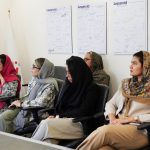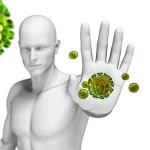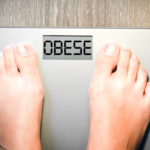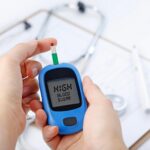On 7 April 2023 ̶ World Health Day ̶ the World Health Organization will observe its 75th anniversary.
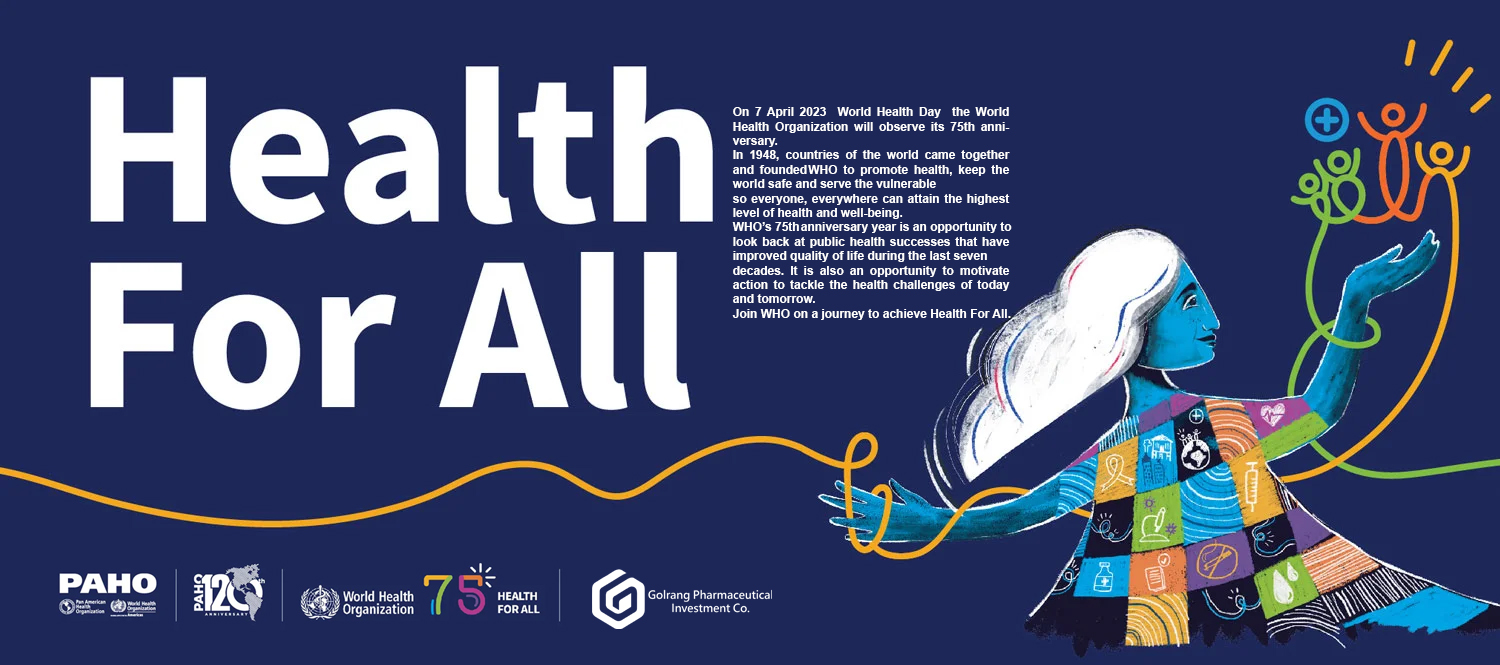
In 1948, countries of the world came together and founded WHO to promote health, keep the world safe and serve the vulnerable – so everyone, everywhere can attain the highest level of health and well-being.
WHO’s 75th anniversary year is an opportunity to look back at public health successes that have improved quality of life during the last seven decades. It is also an opportunity to motivate action to tackle the health challenges of today ̶ and tomorrow.
Join WHO on a journey to achieve Health For All.
#HealthForAll #WHO75
Health For All envisions that all people have good health for a fulfilling life in a peaceful, prosperous, and sustainable world.
The right to health is a basic human right. Everyone must have access to the health services they need when and where they need them without financial hardship.
۳۰% of the global population is not able to access essential health services.
Almost two billion people face catastrophic or impoverishing health spending, with significant inequalities affecting those in the most vulnerable settings.
Universal health coverage (UHC) offers financial protection and access to quality essential services, lifts people out of poverty, promotes the well-being of families and communities, protects against public health crises, and moves us toward #HealthForAll.
To make health for all a reality, we need: individuals and communities who have access to high quality health services so that they can take care of their own health and that of their families; skilled health workers providing quality, people-centred care; and policy-makers committed to investing in universal health coverage.
Evidence shows that health systems powered by a primary health care (PHC) approach is the most effective and cost-effective way to bring services for health and well-being closer to people.
COVID-19 set back every country’s journey to #HealthForAll.
COVID-19 and other health emergencies, overlapping humanitarian and climate crises, economic constraints, and war, have made every country’s journey to #HealthForAll more urgent. Now is the time for leaders to take action to meet their universal health coverage commitments and for civil society to hold leaders accountable.
Progress needs to be accelerated if health-related SDGs are to be met.
Demand your right to access the health services you need without falling into financial hardship!
Investing in strong health systems is critical for a prosperous society. Increasing public financing for health and lowering out-of-pocket health costs saves lives while advancing the Sustainable Development Goals beyond health.
Strong health systems are needed to deliver both universal health coverage and emergency preparedness.
Universal health coverage is a political and social choice. We need strong political leadership and public demand.
Healthy living environments can transform people’s lives.
WHO recommends increases in “health taxes” on tobacco, alcohol, added sugar, and fossil fuels. These taxes bring in much needed public revenues.
Between 2023-2030 there is a projected shortfall of 10 million health workers worldwide. Investment in education and job creation for the health sector is needed.
ACTION POINTS
Shift from economies driven by profit and pollution to economies driven by fairness and well-being.
Success must be measured by the well-being of people and healthy environments.
Engage and empower individuals, families and communities for increased social participation and enhanced self-care in health. Ensure informed and active participation, with people at the center of health decisions and outcomes.
Strengthen integrated national health systems using a PHC approach to deliver essential quality services with financial protection, with equity-oriented, gender-sensitive and rights-based programming to reach and engage those in greatest need and improve the health and well-being of all people at all ages.
Enable non-State actors to participate in government-led planning, progress reviews or implementation towards UHC.
What is primary health care?
The concept of PHC has been repeatedly reinterpreted and redefined in the years since 1978, leading to confusion about the term and its practice. A clear and simple definition has been developed to facilitate the coordination of future PHC efforts at the global, national, and local levels and to guide their implementation:
“PHC is a whole-of-society approach to health that aims at ensuring the highest possible level of health and well-being and their equitable distribution by focusing on people’s needs and as early as possible along the continuum from health promotion and disease prevention to treatment, rehabilitation and palliative care, and as close as feasible to people’s everyday environment.” WHO and UNICEF. A vision for primary health care in the 21st century: Towards UHC and the SDGs.
PHC entails three inter-related and synergistic components, including: comprehensive integrated health services that embrace primary care as well as public health goods and functions as central pieces; multi-sectoral policies and actions to address the upstream and wider determinants of health; and engaging and empowering individuals, families, and communities for increased social participation and enhanced self-care and self-reliance in health.
PHC is rooted in a commitment to social justice, equity, solidarity and participation. It is based on the recognition that the enjoyment of the highest attainable standard of health is one of the fundamental rights of every human being without distinction.
For universal health coverage (UHC) to be truly universal, a shift is needed from health systems designed around diseases and institutions towards health systems designed for people, with people. PHC requires governments at all levels to underscore the importance of action beyond the health sector in order to pursue a whole-of government approach to health, including health-in-all-policies, a strong focus on equity and interventions that encompass the entire life-course.
PHC addresses the broader determinants of health and focuses on the comprehensive and interrelated aspects of physical, mental and social health and wellbeing. It provides whole-person care for health needs throughout the lifespan, not just for a set of specific diseases. Primary health care ensures people receive quality comprehensive care – ranging from promotion and prevention to treatment, rehabilitation and palliative care – as close as feasible to people’s everyday environment.
Why is primary health care important?
Member States have committed to primary health care renewal and implementation as the cornerstone of a sustainable health system for UHC, health related Sustainable Development Goals (SDGs) and health security. PHC provides the ‘programmatic engine’ for UHC, the health-related SDGs and health security. This commitment has been codified and reiterated in the Declaration of Astana, the accompanying World Health Assembly Resolution 72/2, the 2019 Global Monitoring Report on UHC, and the United Nations General Assembly high-level meeting on UHC. UHC, the health-related SDGs and health security goals are ambitious but achievable. Progress must be urgently accelerated, and PHC provides the means to do so.
PHC is the most inclusive, equitable, cost-effective and efficient approach to enhance people’s physical and mental health, as well as social well-being. Evidence of wide-ranging impact of investment in PHC continues to grow around the world, particularly in times of crisis such as the COVID-19 pandemic.
Across the world, investments in PHC improve equity and access, health care performance, accountability of health systems, and health outcomes. While some of these factors are directly related to the health system and access to health services, the evidence is clear that a broad range of factors beyond health services play a critical role in shaping health and well-being. These include social protection, food systems, education, and environmental factors, among others.
PHC is also critical to make health systems more resilient to situations of crisis, more proactive in detecting early signs of epidemics and more prepared to act early in response to surges in demand for services. Although the evidence is still evolving there is widespread recognition that PHC is the “front door” of the health system and provides the foundation for the strengthening of the essential public health functions to confront public health crises such as COVID-19.
Caring for those who take care of us
Public health achievements have been made possible thanks to the tireless efforts of generations of health workers around the world. WHO has been promoting the work of health workers, who have made all these health landmarks happen, from the eradication of smallpox to dramatic progress in delivering HIV treatments.
Tackling noncommunicable diseases and mental health
Enjoying good health means not merely living without disease but also achieving a state of complete physical, mental and social well-being. WHO has been working to protect people from key risks that lead to chronic diseases, such as tobacco use, physical inactivity, the harmful use of alcohol and unhealthy diets. These risks lead to diseases and conditions such as diabetes, cancer, stroke, and associated trauma and suffering, accounting for 74% of all deaths worldwide.
Addressing antimicrobial resistance
Over the decades, we have seen both misuse and overuse of modern medicine. As a result, our common defence against diseases has weakened. This has led to the appearance of new microbes resistant to the known medicines and they threaten the progress we have made in better health and a longer lifespan. Antimicrobial resistance is a development and global health threat.











